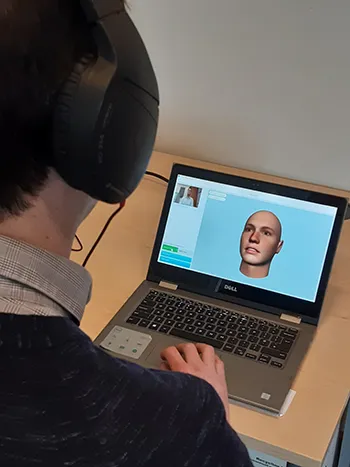Voices are common in people with psychosis and can be extremely distressing for individuals and their families. AVATAR aims to help diminish this distress and we are delighted that Wellcome are supporting this second trial of the therapy which aims to obtain a definitive picture on its effectiveness alongside assessing the economic and practical feasibility of implementing the therapy at a wider scale.
Principal Investigator on the AVATAR project, Professor Philippa Garety from the IoPPN
28 October 2020
AVATAR project receives £3.37m to help those with auditory hallucinations
A team of researchers led by King’s College London will be extending the evaluation of the unique AVATAR therapy and assessing the feasibility of making it available in the NHS across the UK, thanks to funding from Wellcome.
Developed by UCL, UCL Business and King's, AVATAR therapy uses digital avatars to represent the internal voices experienced by people with psychosis to help them cope with the distress caused by the voices. A previous clinical trial, led by King’s and hosted by South London and Maudsley NHS Trust, showed in 2017 that the therapy resulted in a rapid and substantial fall in frequency and associated distress of voices that was superior to a supportive counselling control condition at 12 weeks.

Led by researchers at the Institute of Psychiatry, Psychology & Neuroscience (IoPPN), King’s College London, the AVATAR project has now been awarded nearly £3.5million additional funding by Wellcome to further assess the therapy’s effectiveness at four UK sites in Glasgow, Manchester and London and gauge its potential to be implemented in the NHS.
Around 60 to 70 per cent of people who have schizophrenia experience auditory hallucinations and these voices can often be distressing and threatening. AVATAR therapy involves the use of a digital simulation (avatar) of what the person believes is the source of the voice in a three-way discussion between participant, avatar and therapist.
AVATAR therapy
The first phase of the therapy focusses on managing anxiety and supporting the participant to stand up to the avatar. The second phase considers the specific character and nature of the voice in more detail, during dialogues in which the avatar concedes power and control to the person. Both phases of the therapy have been refined in line with the results from the first AVATAR trial.
The previous trial showed very promising results that demonstrated that AVATAR therapy could help those with psychosis cope with distressing auditory hallucinations.
Emeritus Professor Tom Craig from IoPPN who led the first AVATAR trial
He added, ‘At that time, we knew the next step to bringing this therapy to patients was to look in more detail at the effectiveness of the therapy and to evaluate it in centres across the UK. We are now building on the results from the previous trial to look at the suitability of different aspects of the therapy for different patients and how it could ultimately become available nationwide.’
Multi-centre trial

This new trial will evaluate the AVATAR therapy in more depth and assess the cost-effectiveness and feasibility of rolling out the therapy across the UK. The trial will recruit 345 participants across eight clinical settings in four centres linked to the Universities of Glasgow of Manchester, UCL and KCL. This will involve training therapists in AVATAR therapy across the UK.
Participants will be allocated to receive brief AVATAR therapy (first phase only), extended AVATAR therapy (first and second phases) or treatment as usual. The software has also been further developed to make it more usable for busy clinicians.
Professor Mark Huckvale from UCL who is responsible for the software system that supports the therapy said: ‘The proposed outcomes of this new trial will be a tested system for providing AVATAR therapy and a body of clinicians trained in its use, both of which are essential for its wider availability.’
Aims of the research
Recruitment is planned to start in January 2021 and the trial will have four main goals:
- To examine the effects of brief and extended AVATAR therapy in order to provide insight into which patients would be likely to benefit from the different versions.
- To assess the relative cost-effectiveness of the two versions of AVATAR therapy compared to routine treatment.
- To broaden the availability of AVATAR therapy by increasing the number of staff trained across several geographically dispersed NHS settings.
- To provide the evidence on effects and cost-effectiveness necessary to take AVATAR therapy to recommendation by guideline bodies such as NICE.
Through our Psychosis Flagship funding, projects like AVATAR aim to improve the outcomes for patients with psychosis by improving diagnosis, maximising the impact of early treatment and developing new, targeted interventions.
Ann Mills-Duggan, from Wellcome's Innovations team
She continued, ‘The AVATAR project has already delivered exciting results from the previous trial that resulted in a significant reduction in the occurrence and distress from internal voices experienced by those with psychosis. Through continuing this funding, we hope to receive crucial insight from this new study into the potential of the therapy and hopefully improve the lives of even more patients.’
Image credits: Clementine Edwards and Tom Ward at KCL
Contact
For further information please contact Alice Kay, Interim Senior Press Officer at alice.kay@kcl.ac.uk / +44 7718 697176
